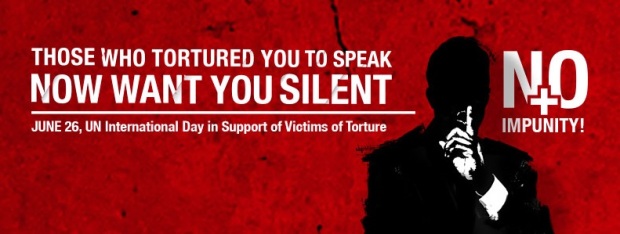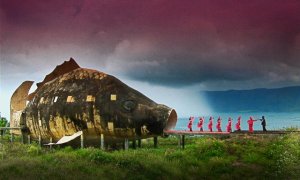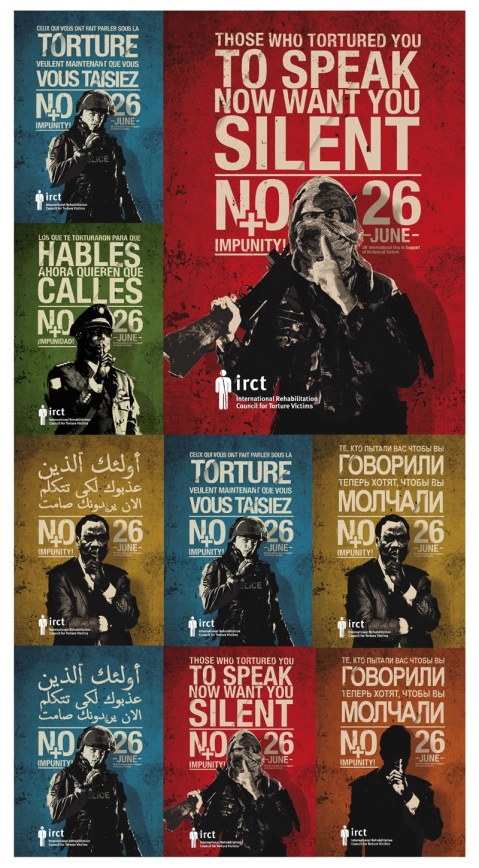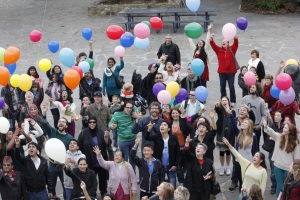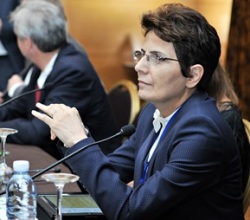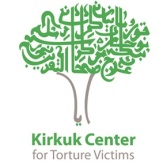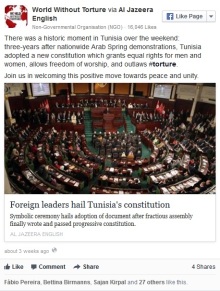Posts Tagged survivor_voices
26 June is here: Join us in fighting impunity
Posted by World Without Torture in 26 June on 26/06/2014
The 26 June UN International Day in Support of Victims of Torture is here. Organisations and human rights defenders across the globe are standing united right now to end impunity, the theme of this year’s 26 June campaign – and you can join them with your voice today.
Social media:
Throughout the day World Without Torture’s Facebook and Twitter pages will be updated with the latest information on what groups across the globe are doing to mark this important day. Don’t forget to use the hashtags #26June and #NoMoreImpunity wherever you can.
Global map of events:
You can see on our global map to find out exactly what IRCT centres are holding today – and in the coming weeks – to help create a world without torture.
IRCT Global Reading for 26 June: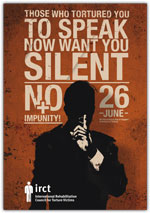
Every day crimes of torture are committed across the globe and, in many of these cases, justice is never served – the perpetrators are still free and the victims are denied any access to rehabilitation.
But there is hope and organisations across the world are attempting to create a world without torture. You can read and share the full global reading here (also in French and Spanish) to get an idea of how the work we do is having a positive impact on the world, even if at times the fight against torture seems lengthy.
26 June campaign kit:
If you want to use any of our campaign materials still then please do so by clicking this link.
Here you will find all the posters, factsheets and statements relating to the 26 June.
What is happening right now?
Already organisations around the world have begun hosting their events: ASeTTS in Australia have hosted their panel meeting on how to fight impunity; Fora Penal in Venezuela are holding a forum on impunity; BCHRD in Bangladesh are standing united to promote the rights of torture victims; and APT have created an excellent video explaining what impunity is. These are just some of the hundreds of organisations who will mark the fight against impunity and torture today.
Those who tortured you to speak now want you silent.
Join us in the fight against impunity #NoMoreImpunity.
‘The Act of Killing’ to feature in IRCT’s 26 June campaign
Posted by World Without Torture in 26 June on 25/06/2014
This year the 26 June Global Campaign has teamed up with the team behind Oscar-nominated documentary ‘The Act of Killing’ to distribute free film screenings to mark the day of fighting impunity.
The film, from Joshua Oppenheimer, portrays a society shaped by extreme violence, where past atrocities are yet to be reconciled and painful memories are yet to be incorporated into public discourse. By reflecting on the condition of impunity, the film raises critical questions related to this year’s campaign theme: fighting impunity.
To mark the day the film team are allowing those hosting 26 June campaigns across the world to host the film for free, for a limited period of time.
So far 15 centres have received permission from the filmmakers to host a screening with four screenings planned in the next few weeks by BCHRD in Bangladesh, RCTV Memoria in Moldova, HRO in Sri Lanka, Ethel AMSA in the Phillipinnes, and CVT in Kenya.
Now you can join too.
How to host a screening
To host a screening all you need to do is write our friend Elinor from Filmplatform.net (elinor@filmplatform.net) and let her know you wish to screen the film as part of your 26 June campaign. She will send you an agreement for a one-time screening and you will receive the film in a suitable format, depending on your needs.
Also if you wish to invite the director for a post-screening discussion via Skype, you can do that too. Just let Elinor know and she will check on availability.
It is an exciting development for this year’s campaign, which promises to be the biggest yet.
For all the relevant material for the campaign this year, click this link.
Those who tortured you to speak now want you silent.
Join us in fighting impunity on 26 June.
Creating a world without torture: February in review
Posted by World Without Torture in Advocacy and Influencing Policy, Asia, Europe, From our members, Justice, Middle East North Africa, News & Clippings, Pacific, Prevention, Rehabilitation on 28/02/2014
Despite being the shortest month of our calendar, February has been packed with important news stories, statements and developments across the anti-torture movement.
We summarise some of our most popular blogs, social media content and news releases below. Simply click the relevant links and pictures to read the full stories.
10 questions and answers about torture rehabilitation
Ever wondered what can be achieved through rehabilitation? Ever wanted to know exactly what can be done to help victims of torture overcome their past? Or have you simply questioned how many centres across the globe offer torture rehabilitation services?
This month we collected the top ten questions asked by our readers about anti-torture work and answered them with links to our work. Just click the picture or this link to read more.
IRCT President awarded Council of Europe prize
Another popular story this month came from the IRCT whose President, Suzanne Jabbour, has been awarded the prestigious North-South Prize from the Council of Europe in recognition of her lifelong commitment to preventing torture.
The award, which will be presented this Spring in Lisbon, Portugal, has a long list of famous previous winners including Kofi Annan and Bob Geldof.
Suzanne is overjoyed with her victory and we want to thank everyone who joined us in congratulating Suzanne on this award. Read the full story here.
‘Wheel of Torture’ shows more must be done to stop torture in the Philippines

Detainees can be subjected to torture such as “20 seconds Manny Pacman” which means 20 seconds of nonstop punches. (Courtesy of the Commission on Human Rights)
A prison guard takes a detainee from his or her cell, escorts them to a roulette-style wheel listing different methods of torture, and spins the wheel to determine just how much pain should be inflicted on the prisoner.
This ‘Wheel of Torture’, which uses torture as a game, came to light in the world media this month following an inspection of prisons in the Philippines and shocked human rights groups worldwide.
The practice not only showed us how torture is still being reinvented and adapted in sadistic ways, but also showed just how little is being done in the Philippines to stop torture. You can read our full blog on this, and the statement from human rights defenders in the country, by clicking this link.
‘Act of Killing’ BAFTA victory is important for anti-torture movement
A story we shared on Facebook this month garnered much attention – the vivid, hard-hitting documentary ‘The Act of Killing’ achieved must deserved recognition from the British Academy of Film, Television and Arts (BAFTA) this month, receiving the award for Best Documentary at the latest awards ceremony.
Click our status below to watch an interview with the filmmaker Joshua Oppenheimer following the award.
The challenges facing torture rehabilitation in northern Iraq
We caught up with IRCT member the Kirkuk Center for Torture Victims in Iraq this month to see what they are doing to help survivors of torture in the region.
The newest member of the IRCT movement, the Kirkuk Centre have extensive links across the north of the country to aid victims of torture from all backgrounds, from those affected by the war in Iraq, to the recent influx of Syrian refugees in the region.
It comes as part of our ‘On the Forefront’ series, which you can see all the entries for by clicking this link.
Tunisia passes new constitution
Incredible news from Tunisia this month, who passed a new constitution promoting equal rights for women, freedom of religious expression, and freedom from torture – all ratified just three years after revolution.
We joined world leaders in congratulating Tunisia on this move which will hopefully push other contries to follow the lead.
Click here or the picture for more information.
Change in Bahrain is needed now, not in another three years
However in Bahrain, which also experienced uprisings against the government three years ago, the situation of ill-treatment of protestors and limits to freedom of expression has not changed.
Protests continue on a daily basis, and the three-year anniversary since the beginning of the protests was tragically marked itself by further protests and excessive crackdowns from the authorities.
Bahrain needs to change now. It simply cannot wait any longer. Read the full story by clicking the picture or clicking this link.
For further information from World Without Torture, do not forget to ‘like’ us on Facebook and follow us on Twitter. Click here to visit our Facebook page, and here to visit our Twitter feed.
Thank you for commemorating the International Day in Support of Victims of Torture
Posted by World Without Torture in Uncategorized, Voices on 28/06/2012

Orly Marcellana, Spokesperson of Save Bondoc Peninsula Movement posed in front of a military camp in Quezon province – Philippines to support a World Without Torture. June 26, 2012
This year, more than 80 organisations around the world commemorated the day with activities ranging from conferences to theatre performances. Hundreds of people joined the online observation of the day on Facebook and many more shared their messages in support of torture victims on Twitter.
The 26 June is over but the work against torture and in support of torture survivors must be carried out 365 days a year.
There are many ways you can get involved and support this work:
Donate to the IRCT and help rehabilitation centres around the world provide healing services to victims, their families and communities.
Share our dream of a World Without Torture on Facebook and Twitter.
Do you want to be updated about out work?
Subscribe to our monthly newsletter
26 June Global Report 2011
We are already working on this year’s report. Please send us your photos and short report of your events until 26 July to 26june@irct.org. See past reports here.
Already thinking about 26 June 2013?
Get some inspiration in our campaign tools and 26 June around the world map.
Trauma and torture in armed conflict: A story from Amita in Nepal
Posted by World Without Torture in Voices on 18/06/2012
Editor’s Note: Rehabilitation works and is a torture survivor’s right: this is the theme of this year’s 26 June campaign for the UN International Day in Support of Victims of Torture. During the next two weeks, we shall be posting testimonies, stories and experiences from torture survivors themselves. Their testimonies explain clearly – rehabilitation works and is a torture survivor’s right.
Many survivors of torture come from countries with ongoing armed conflict. In Nepal, the 10-year civil war between Maoists and government forces led to the deaths of approximately 15,000 Nepalis and an estimated 100,000 to 150,000 were displaced as a result. This is the direct testimony of Amita*, which was translated and submitted by member centre Transcultural Psychosocial Organization (TPO), based in Kathmandu.
“At the time, I was 50 years old. Around 100 soldiers came to my house at around 7 am from the district headquarters. They said to me, ‘You have given food and shelter to the combatant, haven’t you?’
“One of the soldiers slapped across the face three times. My face swelled, and I screamed with pain.
“Ten days later, the soldiers came to my house again at 7 am and again abused me. ‘You have given food and shelter to the Maoists, haven’t you?’ At that time, my younger son was in the next home. They pulled him from the house, and a soldier put a gun to his forehead and shot him. My son died on the spot.
“At the same time, they arrested by elder son and took him to jail in the headquarters. He was physically and mentally tortured many times in jail. They kept him there for three months. We appealed to the politicians, and they in turn told the armies. After that, they released him. He was swelling. I shouted. We took my elder son to the hospital for treatment.
“Nowadays, my elder son cannot work. I have stomach problems and swelling. I have lost my younger son. I am an illiterate housewife, and thus, my economic condition is very poor. I have in total four sons and one daughter, but I need both legal and economic support.”
Report from the centre:
Amita was referred to Transcultural Psychosocial Organization (TPO) for much-needed psychosocial support. During her counselling sessions, it was discovered that she had been suffering greatly from feelings of irritation and anxiety about day-to-day life – irritation in her daily work, problems with self-care, discussions with other members of the family, crisis in thinking about the future, and confusion over everyday decisions.
Psychosocial counsellors met with Amita and provided much-needed emotional support. After a few sessions, Amita expressed a great improved in her outlook and self-confidence. This case is still ongoing.
* not her real name
Rebuilding life after sexual violence and torture: the story of Helen from Kenya
Posted by World Without Torture in Voices on 12/06/2012
She was raped and tortured for 24 hours by armed soldiers at Mt Elgon; but Helen has now rebuilt her life with a new husband and a baby with the help of a rehabilitation centre in Kenya.
Editor’s Note: Rehabilitation works and is a torture survivor’s right: this is the theme of this year’s 26 June campaign for the UN International Day in Support of Victims of Torture. During the next two weeks, we shall be posting testimonies, stories and experiences from torture survivors themselves. Their testimonies explain clearly – rehabilitation works and is a torture survivor’s right.
Mount Elgon District is a small, rural area in western Kenya that has long been in a conflict that escalated in 2005 when the rebel group Sabaot Land Defence Force (SLDF) took up arms in a land dispute. The Kenyan military were dispatched to the area in 2008. Reports quickly emerged that the Kenyan military had followed the tactics of the rebel group: both armed forced were accused of ongoing assaults, kidnapping, torture and murder of Mt. Elgon residents. Mwatikho Torture Survivors Organization (MATESO), a human rights organisation and IRCT member centre in Kenya, has been at the forefront of documenting the cases there and treating the victims of torture. Watch their 30-minute documentary on the Mount Elgon conflict and the human rights violations.
Helen lives in Mt Elgon, an area that has been affected by conflict since 1992 to date. Nearing the election period in 2006, an organised militia sprung up called Sabaot Land Defence Force (SLDF); they extorted, tortured, raped, abducted and forced disappeared, murdered and evicted people from the mountain.
Helen, a resident of Chemuses, was tortured and sexually abused by the SLDF in 2007. She was still living in the Mt. Elgon region, with her husband and four children, in August of 2008 when a group of five men came into her compound.
At around 5pm, Helen was home when the men came to her compound. They asked for her husband, but he was not at home. They demanded to know how many of the SLDF she knew; since they alleged that she went round talking about them. She declined and that is when they kidnapped her and brought her to an unknown place.
There, they blindfolded her, raped her in turns and even beat her for almost 24 hours. The following day she was unconscious, but they did not let her go. She was told to open her mouth where one of them urinated and yet another forced her to eat human feces.
After all this, they left her, but she was nearly unable to walk home because of the pain she had. She forced herself up because she believed that if she continued to stay there, others might come and continue the torture. She tried, and thankfully, a person helped her home.
When she made it home, her husband took her to hospital where she was treated and tested for HIV/AIDS. Later on that husband rejected her, alleging that she was infected with HIV/AIDS and other venereal diseases. In this domestic dispute, she lost her child as a result of family negligence and the stigmatisation she underwent.
She also lost her first husband but found a new one, with whom she now has one child.
MAHTESO intervened in the case providing Helen with treatment and counseling. They have set routine home-based visits and care. Although she had been treated before, it was not enough as she still complained of chest pain and backache. Helen and her family still have a long way to go – they require counseling sessions about once or twice a month. But with the organisation’s ongoing support, Helen is moving towards an increasingly full and healthy life.
To get to the truth, there needs to be reform
Posted by World Without Torture in News & Clippings on 09/01/2012
If you have been following the sprawling UK inquiry into detainees rendered during the so-called ‘war on terror’, you may have noticed the announcement this Friday that Abdul Hakim Belhadj, a former Libyan rebel leader who just last month announced he would take legal action against the UK government for his alleged torture, would not take part in the inquiry.
He says the inquiry lacks sufficient powers “to get to the truth of Britain’s involvement” in abuses. We agree.
The IRCT has joined other human rights organisations, two former UN special rapporteurs on torture, and other international experts in calling for reform of the UK ‘Detainee Inquiry’:
We contend that fundamental problems plague the inquiry, thus, leaving it open for a lack of credibility.
“Without substantial changes, it will not get to the truth of Britain’s involvement or ensure such abuses do not occur again,” the letter states.
Read our entire statement here, and the open letter to UK Prime Minister Cameron here (PDF).
#torture: Do you mean it?
Posted by World Without Torture in News & Clippings, Voices on 05/01/2012
Editor’s Note: The following contains brief descriptions of torture methods.
Logging onto to Twitter, I pull up the search tab for all Tweets marked with #torture. Some describe the upcoming trials of Bahrain police officers for torture; some link to news stories on rendition. But by far the majority of them feature some variations of the following:
Lying in bed counting down the minutes until I have to actually get up. #torture
Rain + wind #torture
I’ve been putting my alarm on snooze for a minute since half 6?! And managed to fall asleep every minute just to be woken up! #torture
When your feet are freezing and you have to take a hot shower. #torture
Of course, people are apt to hyperbole on Twitter, and it’s not uncommon to hear the word ‘torture’ used colloquially to simply mean an uncomfortable experience. On Twitter, more often than not, ‘torture’ simply means getting up early.
Misuse of the term ‘torture’ is rife in the media, too. Reading the daily clippings – sent to us by email through a search of the word ‘torture’ – part of my job is to search and filter the results to send out to our member network and the staff at the Secretariat. I search for stories regarding incidences (or circumstances that may lead to) torture, as defined by the United Nations:
… Torture means any act by which severe pain or suffering, whether physical or mental, is intentionally inflicted on a person for such purposes as obtaining from him or a third person information or a confession, punishing him for an act he or a third person has committed or is suspected of having committed, or intimidating or coercing him or a third person, or for any reason based on discrimination of any kind, when such pain or suffering is inflicted by or at the instigation of or with the consent or acquiescence of a public official or other person acting in an official capacity. It does not include pain or suffering arising only from, inherent in or incidental to lawful sanctions.
So what would a Tweet look like from a torture victim?
Lying on a cold floor, in a cell 1X1 meter, haven’t been allowed to sleep for 8 days #sleepdeprivation
Water + covered face + reclined + feel as though I’m drowning #waterboarding
I’ve been forced to stand in an extremely bright room, loud music played for weeks, completely alone #longtermisolation #solitaryconfinement
When your feet are bull whipped #falanga #torture
When government officials, often police or prison guards in places of detention, inflict such violent and painful acts, many that leave long-lasting mental and physical damages to the victim, this is torture. It’s done often to extract confessions, obtain bribes, retribution, or simply because someone was in the wrong place at the wrong time. Misuse and exaggerated use of this term simply muddles it’s true meaning and the horrible experiences behind it.
 Tessa is communications assistant, focusing on social media and the women and girls projects.
Tessa is communications assistant, focusing on social media and the women and girls projects.
World Without Torture: A film by the IRCT
Posted by World Without Torture in Middle East North Africa, Voices on 06/12/2011
The film is also available with Arabic, French, and Spanish subtitles.
As we approach International Human Rights Day – 10th December – we are very pleased to announce the release of World Without Torture: A film by the IRCT that highlights the importance of documenting torture, as well as providing rehabilitation for torture survivors and working to ensure that torture doesn’t take place to begin with.
The film features the case of Khaled Said. His death at the hands of state police – and the attempt to cover it up through the official autopsy report – sparked massive protests in Egyptin the run-up to the revolution that led to the toppling of Hosni Mubarak’s oppressive regime.
Documenting torture, as in the case of Said and numerous others, is among the key priorities of the IRCT. It can have far reaching results and helps us move towards our ultimate goal: a World Without Torture.
Watch our 15 minute film to see interviews with key activists, human rights defenders, and those on the forefront of anti-torture work and rehabilitation. And celebrate Human Rights Day by sharing this video with friends and family – through e-mail, Facebook, Twitter, and other social media tools.
Raphael from Survivors Speak OUT on his recent UN testimony
Posted by World Without Torture in Voices on 08/11/2011
Editor’s note: Cross-posted from Freedom From Torture blog, a UK-based member centre.

Raphael Kiama (second from right) of Survivors Speak OUT Network speaks during the panel discussion on Rehabilitation of Torture Survivors: How Holistic Treatment can Heal the Wounds and Facilitate Justice and Prevention (co-organized by the Permanent Mission of Denmark and the International Rehabilitation Council for Torture Victims (IRCT)). UN Photo/Eskinder Debebe
The Survivors Speak OUT Network was invited to participate in a side event hosted by the International Rehabilitation Council for Torture Victims (IRCT) on the Importance of Rehabilitation at the 3rd Committee Against Torture held in New York at the Headquarters of the United Nations. Raphael, a member of Survivors Speak OUT, represented the network at this event to talk about rehabilitation for torture survivors.
I had the privilege of representing the network at this event but many people where involved in the preparation to get me there. With network members, we worked together on the recommendations that we think are importance on rehabilitation but also with others who supported this trip including Jude, Centre Manager, and everyone else at Freedom from Torture North West; Shameem, Campaigner, (wonderful all the way) and Sonya, Policy Officer, (who was with me in New York) – both from Freedom from Torture in London; Brita and Miriam of the International Rehabilitation Council for Torture Victims (IRCT); and to the Danish permanent mission to the UN for their generosity and hard work in putting the rehabilitation on the agenda in the international sphere.
At the first view ensuring that rehabilitation is on the agenda at such a meeting would perhaps be seen as normal course of action but, believe me, it is not so straight forward. This is because rehabilitation is not, per se, an intrinsic human rights article readable in its own right. The fact is rehabilitation as a right must be read within Article 14 of the Convention Against Torture and other Cruel, Inhuman or Degrading Treatment or Punishment, which states: “(1) Each State Party shall ensure in its legal system that the victim of an act of torture obtains redress and has an enforceable right to fair and adequate compensation including the means for as full rehabilitation as possible. In the event of the death of the victim as a result of an act of torture, his dependents shall be entitled to compensation. (2) Nothing in this article shall affect any right of the victim or other person to compensation which may exist under national law.”
Please read the full article at Freedom From Torture
